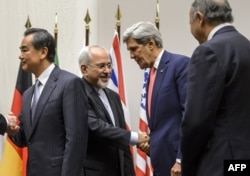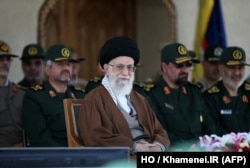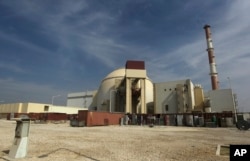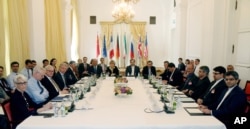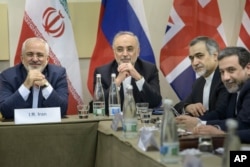More than two years of negotiations on the future of Iran’s nuclear program, and international economic sanctions against it, face a deadline next Tuesday, with the two sides still reported to be far apart on several key issues.
Negotiators from Iran and the six countries deputized by the U.N. Security Council have been meeting regularly to prepare for foreign ministers to join the talks in Vienna, including Iran’s Mohammed Javad Zarif and U.S. Secretary of State John Kerry.
A senior U.S. administration official said Thursday negotiators are expected to be "close" to an agreement on the 30th, if they "can get there at all."
Those involved are predicting the talks will run past the deadline, perhaps by several days, but they also say another lengthy extension is not likely. There have already been two.
A top Western diplomat, speaking to reporters on condition of anonymity in Vienna, said Friday that major differences remain
The diplomat said the most difficult issues must be resolved in the coming days including U.N. inspections of Iran's sites, transparency, sanctions and the possible military dimensions of Iran's atomic program.
Enrichment, sanctions
The stakes are high, with Western officials saying that without an agreement Iran could resume enriching uranium and could have enough fuel for a nuclear weapon within months.
But that would also mean a further toughening of the sanctions, which have already crippled Iran’s economy.
The negotiators from the five permanent Security Council Members – the United States, Britain, France, China and Russia – plus Germany are known as the P5+1. The delegation is chaired by the European Union’s foreign policy chief.
They reached an accord with Iran on key principles three months ago, which, according to details published by the U.S. delegation, appeared to indicate agreement on several contentious points.
But experts said the document also papered over continuing disagreements.
Hard line
On June 23, with just a week to go before the deadline, the ongoing disputes came into the open in a speech by Iran’s Supreme Leader, Ayatollah Ali Khamenei. He took a tough line on several of them.
- He said sanctions must be lifted before international inspectors visit key sites to verify Iranian compliance with its obligations. The P5+1 said compliance verification and sanctions relief must come in coordinated stages.
- He said Iran will not freeze nuclear research and development for 10 years, as the United States reportedly had been agreed on during the previous stage of the talks.
- He said inspectors could not visit military sites or interview Iranian nuclear scientists, both key demands for the P5+1.
In previous statements Khamenei has expressed support for the talks, at least to the extent of allowing his negotiators to see what they could achieve.
Analysts point out that the ayatollah has to address several audiences, including hard-liners in Iran who oppose any deal to limit the country’s nuclear program, and particularly do not trust the United States.
But such specific statements from the Supreme Leader that appear to rule out compromise on key issues, and even to backtrack on existing understandings, have officials worried.
Some options
Still, Ariane Tabatabai, visiting assistant professor of security studies at Georgetown University in Washington, D.C., said while appearing to take a hard line, the ayatollah has carefully left the negotiators some options.
“Over the years, every time he has come out and said things they have been packaged in a way that has given the negotiators the ability to maneuver,” she told VOA via Skype.
Tabatabai said although Khamenei is Iran’s Supreme Leader, Western officials tend to give too much credence to every statement he makes.
“People think that whenever Khamenei comes and says something, that’s it, it’s a very clear red line,” she said. “And it’s not. So far, it has not been.
“A careful examination of everything he has said and everything that has been achieved so far shows that not everything he says ultimately translates into policy,” Tabatabai added.
She noted, in the past, the ayatollah has cited specific figures for the number of nuclear enrichment centrifuges Iran must have, and then negotiators have agreed to much lower numbers.
Tabatabai also said Khamenei has accepted more intrusive inspections than he said he would.
In both cases, she said, some observers predicted the negotiations would break down, and they didn’t.
P5+1 negotiators will certainly be hoping these latest statements follow the same pattern.
Negotiators urged to stand firm
A prestigious group of former U.S. officials has warned that if the international negotiators don’t insist on terms the ayatollah opposes, the final document “may fall short of meeting the administration’s own standard of a ‘good’ agreement.”
The open letter published by the Washington Institute for Near East Policy, is signed by 18 people, including retired general and former CIA Director David Petraeus, former vice-chairman of the Joint Chiefs of Staff retired General James Cartwright, former Middle East negotiator Dennis Ross and Stephen Hadley, who served as national security adviser to former President George W. Bush.
They urge a tough line on inspections, long-term limits on nuclear research, full disclosure of Iran’s past efforts to build a nuclear bomb, and staged sanctions relief tied to Iranian compliance.
They also said the accord should be part of a broader U.S. strategy to counter Iranian influence in the Middle East, including moves to bolster allies in Iraq, Syria and Yemen.
“A lot of people are worried that if the West were to give in to the things the Ayatollah Khamenei is saying, that would be a bad deal,” said Mark Fitzpatrick, director of the Non-Proliferation and Disarmament Program at the International Institute for Strategic Studies.
“I would share the view expressed by the group of eminent former officials that the U.S. has to hold a hard line on some of these key issues, especially verification,” he said in a VOA interview.
For years, Fitzpatrick and other Western experts have been calling for tougher terms for Iran than the Nuclear Nonproliferation Treaty puts on all countries with peaceful nuclear programs because Iran previously concealed an effort to build a nuclear bomb.
While trying to build a bomb, Iran was assuring the world its nuclear program was purely peaceful, the same assurance it gives today.
“Iran really needs to be held to a higher standard, given its past,” Fitzpatrick said. “Iran can’t get a special deal on access that gives them privileges that other countries don’t have, and they actually need more intrusive inspections, given their record of deception to date.”
But Georgetown professor Tabatabai said such measures, are difficult for Iran to accept, particularly the call for interviews with its nuclear scientists.
“On the one hand, it really wants a deal,” she said. “On the other hand, it needs to make sure that the deal doesn’t come at a cost for its national security, which access to its military facilities, to nuclear scientists, could potentially jeopardize.”
'Not fixated on Iran'
Secretary Kerry appeared to give ground on that issue 10 days ago, when he said, “We’re not fixated on Iran specifically accounting for what they did at one point in time or another. We know what they did.”
Kerry’s remarks were interpreted as indicating the United States is more interested in ensuring that Iran does not build a nuclear weapon in the future, than on forcing it to disclose what it has done in the past.
Fitzpatrick acknowledged the tougher inspections he would like to see may not happen.
“As long as there is a way for the IAEA (International Atomic Energy Agency) to be able to verify that future activity does not involve weaponization work,” he said, “then some of the past activities don’t have to be resolved 100 percent.”
But he added that that would require a tough inspection program going forward.
"Iran can’t get a special deal on access that gives them privileges that other countries don’t have,” he said.
As a result, Fitzpatrick said the ayatollah’s comments are worrisome.
“The Supreme Leader’s speech on Tuesday did make me worried because he seemed to be walking back from some of the tentative agreements that had been reached,” he said. “If you took it at face-value, the things that he said are going to be deal breakers.”
Deal can be reached
But Fitzpatrick agrees that the statements should not be taken "at face value," and said a good deal can be reached.
“The reason I’m optimistic there will be a deal is because the hardest compromises have already been made,” he said.
Still, he worries about the large number of difficult issues remaining and the short amount of time to deal with them.
“There are still so many remaining issues because Iran has not wanted to make any further progress,” he said. “They have kept everything open until the very end stage.
"I’m afraid that some important details are going to slip through the cracks and that implementing a deal won’t be the airtight arrangement that it needs to be," Fitzpatrick said.
“The comprehensive deal, if and when it is struck, needs to be clear and detailed as to what is allowed and what’s not allowed,” he added.
Fitzpatrick does not expect that to happen by next Tuesday, but said an agreement could come a week or so later.
That would take the talks through the U.S. Independence Day holiday, held July 4, leading Fitzpatrick to offer some advice to the U.S. negotiating team.
“They shouldn’t be planning any barbecues,” he said.

